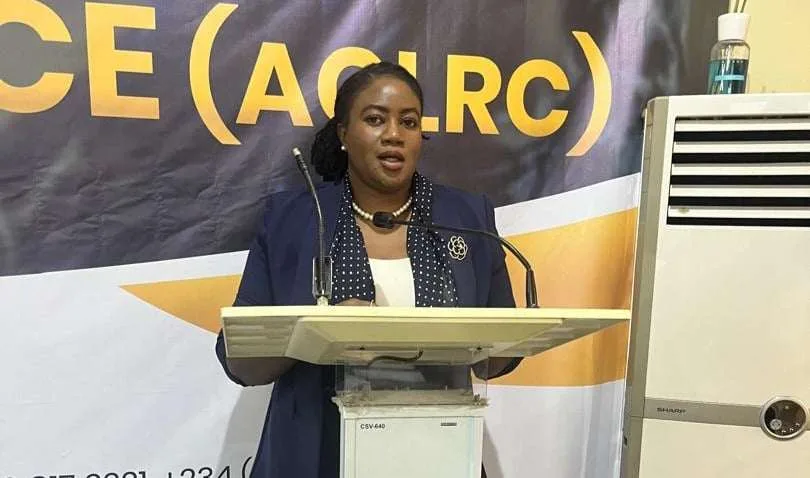CHINELO OFOEGBUNAM SPEAKS ON ‘OPERATION SAVE NAIRA’ AT RULE OF LAW CONFAB
Dancing and being sprayed by paper to demonstrate the Operation Save the Naira Initiative, Chinelo Audrey Ofoegbunam today, 21st November, 2024 spoke at the Rule of Law Development Foundation’s 6th Annual Criminal Law Review Conference.
The theme of the conference was: Optimizing the Administration of Criminal Justice in Nigeria: How to Navigate Emerging and systemic challenges of insecurity and Economic Hardship.
She spoke on the topic, “OPERATION SAVE THE NAIRA: UNDERSTANDING THE PURPOSE AND SCOPE OF SECTION 21 OF THE CBN ACT 2007; THE PROSECUTORIAL LIMITS OF THE STATE – IF ANY, THE LIABILITIES OF PERSONS; AND THE PROHIBITION OF CURRENCY MUTILATION AND ABUSE AND ALLIED OFFENCES, (THE ‘BOBRISKY’ AND ‘CUBANA CHIEF PRIEST’ DIMENSION)”.In recent years, social media has become a powerful tool shaping cultural norms and influencing behavior. In Nigeria, influencers like Bobrisky and Cubana Chief Priest have amassed millions of followers, showcasing lavish lifestyles and extravagant spending. However, this display raises important questions about the impact on currency usage and potential abuse.
Section 21 of the CBN Act 2007 prohibits currency mutilation, defacement, or destruction to maintain public trust, hawking, and prevent counterfeiting. Despite this, currency abuse persists, often fueled by social media displays.
Currency mutilation includes actions like cutting, defacing, matching, perforating, or otherwise physically changing Nigerian coins or notes.
Additionally, the clause forbids using bank notes for uses other than those that the CBN intended, such putting designs on them or destroying their integrity while in circulation.
Contextualizing the acts against the stringent definition of money mutilation is crucial when analyzing the “Bobrisky” and “Cubana Chief Priest” dimensions. Money that is sprayed or flaunted in public, as is frequently done during festive occasions, does not always constitute mutilation unless there is proof that the currency was purposefully chopped, defaced, or rendered unfit for use.
While these behaviours may be considered cultural or social concerns, they do not often fulfill the definition of “currency mutilation” under Section 21(1).
The scope and aim of Section 21 appear is to be focused on protecting the integrity of Nigerian currency, ensuring it stays suitable for its role as legal tender, and safeguarding its value within the economy. While prosecution discretion under the Act may extend to cases of misuse, there is a clear need to distinguish between behaviours that jeopardize the currency’s utility and purely ceremonial displays of wealth.
In terms of prosecutorial limitations, the state must demonstrate that the accused knowingly or intentionally violated the provisions of the law. And the Federal High Court has exclusive jurisdiction in this regard.
The CBN, EFCC, and law enforcement agencies can investigate and prosecute currency abuse offenders. Individuals face fines (up to ₦50,000) and imprisonment or both, while organizations risk fines, penalties, or license revocation. However, prosecution may be hindered by jurisdictional limitations, evidence quality, and resource constraints.
The CBN reported that over N100 billion is spent on currency printing and replacement each year, with damage from misuse and mishandling accounting for a large portion of this expense. “The misuse of naira notes, such as spraying, stepping on, and squeezing during celebrations, accelerates their deterioration,” the CBN said in a 2022 press release, underscoring the need to preserve currency notes’ longevity. The great majority of money wear, according to statistical data, is caused by environmental variables and inadequate storage, not by celebratory customs.
I am also of the view that there should be a distinction between cultural habits that involve money as a symbol of joy as against acts that directly harm its usability. This distinction is critical for interpreting Section 21 of the CBN Act, as a blanket interpretation risk criminalizing cultural manifestations while ignoring the root causes of currency mutilation.
Bobrisky’s Instagram posts showcasing cash-filled boxes and Cubana Chief Priest’s lavish spending have sparked debates. While their actions may not directly contravene Section 21, they potentially promote currency abuse and materialism. This raises questions about regulatory bodies’ role in addressing influencer-driven currency misuse.
Liability under the Act necessitates unambiguous proof that the acts harmed or were likely to harm the currency’s intended use, which could be difficult to prove in the cases of Bobrisky and Cubana Chief Priest. In the end, even if Section 21 aims to discourage actions that would jeopardize the usefulness of Nigerian currency, its application to public celebrations needs to be carefully thought out to prevent overreach or a misreading of the law’s intent.
In order to effectively address public concerns without confusing them with criminal responsibility under the Act, a more seminar of the cultural and societal ramifications of such behaviours may be necessary.
Ultimately, the recommendations would be for responsible social media practices and financial literacy can foster a culture of respect for Nigeria’s currency; Regulatory bodies should engage with social media platforms to monitor and address potential currency abuse.
Public education campaigns should emphasize responsible currency handling and financial literacy, and influencers should promote positive financial values and responsible spending habits.
The nature of the criminal offences, being victimless, requires that a re-orientation campaign by relevant agencies, including the CBN, the National Orientation Agency, state governments, federal and state Ministries of Education, banks, and non-bank financial institutions, be considered. Education and awareness programmes, which can be infused into school curriculum, are essential for the long-term subsistence of the current campaign.
It is even more important to initiate community engagement interventions across different groups in order to foster dialogue and discussions, which are essential in challenging the
practices.
Leaders and cultural influencers are important in promoting cultural change. Media, both traditional and alternative, must be employed.
There is no denying that the practice of spraying naira notes, although a cultural norm, is a criminal action. However, changing cultural norms is a long-term process that requires sustained commitment and employment of different tools. Criminal prosecution is only but one tool among many others that should be employed, and they must be employed holistically.
“Operation Save the Naira” requires a comprehensive approach to protect the Naira’s integrity and stability. By implementing advanced security features, enhancing distribution efficiency,
strengthening enforcement, promoting digital payment adoption, and harmonizing regulatory frameworks, Nigeria can safeguard its currency and promote economic growth.

To join our CITY LAWYER Channel on WhatsApp, click here
To join our Telegram platform, click here
COPYRIGHT 2022 CITY LAWYER. Please send emails to citylawyermag@gmail.com. Join us on Facebook at https://web.facebook.com/City-Lawyer-Magazine-434937936684320 and on “X” (TWITTER) at https://twitter.com/CityLawyerMag. To ADVERTISE in CITY LAWYER or for Special Features, please email citylawyermag@gmail.com or call 08138380083.
All materials available on this Website are protected by copyright, trade mark and other proprietary and intellectual property laws. You may not use any of our intellectual property rights without our express written consent or attribution to www.citylawyermag.com. However, you are permitted to print or save to your individual PC, tablet or storage extracts from this Website for your own personal non-commercial use.
